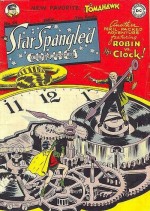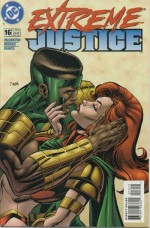
February 21, 2010
 My Six-Month New DC Team Checklist
My Six-Month New DC Team Checklist


So
the initial rush of news regarding
the new executive management team at DC Entertainment has come and gone. Every single professional that can count even one of the five men named to new positions at the powerful media, publishing and intellectual property management company as a friend has seemingly congratulated them. News of a potential move to the west coast has been asked and answered -- if not conclusively. We know that Geoff Johns is mostly remaining where he is, while Dan DiDio and Jim Lee are taking to the skies. We have our first sense of how Diane Nelson operates.
While I was personally disappointed in the lack of specific initiatives announced given the length of time it took to make these announcement and the veteran, in-house status of the majority of the men involved, it also seems likely that these will be forthcoming in
another round -- or rounds -- of announcements designed to maximize their publicity bounce. I'm still struck by the relative oddity of having these personnel announcements come on a Thursday in late February, but I have no reason to think that's not just when the announcements were ready to go. DC had a really good week.
What now? I stand behind my statement on Friday that a veteran management team should mean a greater emphasis placed on how things stand six, 12, 18 months in the future than might be the case for a bolt-from-the-blue new hire. With a new hire in publishing as well as the presidency, we might have greater reason to expect a learning curve and therefore might place greater emphasis on here-to unforeseen skill sets being slowly brought to bear. We don't have that. I expect the changes to come much more quickly from this team of seasoned hands. My hope is that we remain as attentive to DC's performance over the next several months as we are right now to its potential for same. Here are three things I'd like to see from the new DC Comics as they move into the immediate future. Call it my six-months checklist.
1. I would like to see a greater display of celerity when it comes to decision-making.

I think this is important both in terms of the obvious positives that can arise from decisive action, and as a necessary vote of confidence that a certain level of responsiveness will be possible in the current executive framework. Taking six months to put together a mostly in-house team and four months to name its members after it was decided a team formulation was the best way to go, that may have been as necessary as DC claims. In then end, I just don't have access to that information. However, like it or not, this does call into question how long the new DC will take making important decisions in the future.
There are two complicating factors here. The first is that for all its potential advantages, a publishing
team might take longer to come to agreement on important issues. There are certainly ways around administrative logjam, but they have to be displayed, not simply talked about. The second is that DC, by its own admission, feels they are behind schedule in making use of its characters throughout the various Time Warner platforms -- thus the necessity of these moves in the first place! -- and may be moving at a much slower pace with digital publishing than they were with their pioneering work in bookstores. The clock is ticking.
If six months from now we're still talking about DC in terms of general strategies and reviews of existing structures, that would be a troublesome sign. If instead we see a firm decision about an executive editor in the rear view window, concrete moves into the digital arena and a convention season's worth of announcements that break in easy to qualify ways with those made over the last few summers? That would be a positive sign.
2. I think DC needs to reinvigorate its talent development efforts, but in a way that doesn't simply involve publishing a bunch more titles.

This is a tricky one. When I talk to people that cover or even those that simply attentively read mainstream comics, or when I think about them myself, one thing that seems right out there in the open is that Marvel has been more effective at attracting young talent and making many of them seem important in the wider scheme of what that company is trying to accomplish. I don't even read many mainstream comics, but if I hear Marvel is having a creator's summit, I can envision 80 percent of the room. When I go to conventions and see the DC signings, I'm frequently perplexed over what title to which the creators I'm seeing are currently assigned.
Now, I realize that there could be howls of disagreement over this. And I admit I could be wrong, that I could be accidentally kinder towards Marvel on the issue. But even if you don't see it as a special DC need in terms of existing shortcomings in this area vis-Ã -vis Marvel, you have to admit talent development is an ongoing need for companies with DC's reach and ambition. A new management team that doesn't pay attention to bringing in creators and making them important to the company in every way their talent -- not their name -- demands isn't going to keep the fresh new smell for very long.
Unfortunately, the easiest way to develop new talent is to give as many creators as possible jobs by expanding publishing efforts. I haven't checked, but I bet that opening the floodgates has at least been
suggested as something the new DC is going to explore. The problem is that publishing more comics gets DC locked into the chimera of market share gamesmanship. I would argue that market share issues are divorced from DC's ultimate goal of effective, high-yield property management and stronger sales per effort expended on each comic's behalf. I would further argue such strategies are harmful to a crucial portion of the comics market that as currently constituted in terms of infrastructure and a base audience seems to be choking on a lot of product already. Stuffing as many people onto the dance floor may make the night out seem more intense, but in reality it pushes as many people to the exits as it does closer to the stage. Plugging a bunch of individual comics into heretofore never-seen positions on the Diamond charts doesn't seem a goal worth pursuing.
If by the end of the convention season DC can point to a half-dozen creator and character matches that have heat due to
both of those names -- excluding the names "Grant Morrison" or those of the executive management team -- I would consider that a good sign. If monthly comics offerings are up on a title-by-title basis more than 25 percent from 2009, or if high profile assignments are of the kind that have to be unpacked and justified for DC fans rather than simply put out there for people to get enthused about just on the face of them, I think there will still be a lot of work to do and potential harm done.
3. I think the new DC needs to display an aptitude for long-term problem solving and a commitment to same.

Much of the heat that industry players generate among hardcore fans is the back-and-forth of short-term, even reactive efforts. "We're not doing event comics for a while." "We're still doing them better than ever!" "Well, we're really still doing event comics, they're just different." "Not as different as ours." "Rings!" "Variants!" And so on. What gets swept under the rug is bolder action of the kind that by necessity must unfold over several years of effort. Even a company as relatively institutionally invested as DC has been tends to express these commitments in terms of maintaining structures and relationships rather than changing the baselines or driving towards improved outcomes. It's time that changed.
I would like to see a major commitment from the new DC to at least one long-term, not-sexy institutional improvement in or near their publishing core. They certainly have their choice of strategies. Here are three: 1) a commitment to stricter schedule-making in a way that de-emphasizes crowding similar titles on certain dates, doesn't stack potentially series-strengthening runs into mini-series for a reason that isn't clearly obvious and builds an expectation in the audience for when certain books come out; 2) an aggressive program facilitating comic shop store openings that favors neglected areas of coverage and a variety of store models, focused on opportunities provided by the current economy that has led to more people than ever looking towards franchising and small business opportunities; 3) a move towards a proactive digital strategy that involves transparency so that decisions made in terms of price point and timing could be an industry driver and not just a series of in-house contingency plans based on some ill-defined, anticipated event that may or may not ever happen.
If the new team's goal is to make DC the number one comics company in North America, to make a thriving publishing business the heart of intellectual property development across a variety of platforms, they should remember that when Marvel owned the field outright in the 1980s they did so as much through attention to infrastructure as they did to bringing out new X-Men books. They should remember that when DC was in a similar market-dominant position for much of the 1960s it was as much for their control of distribution as it was anything being done with Batman. Many of the great publishing successes of the last decade, from DC's own
Watchmen to Marjane Satrapi's
Persepolis to
Diary of a Wimpy Kid have been existing properties given a second or extended lease on life by the skill their publishers have in escorting such books through a very specific set of marketplaces. Character, creative and format announcements drive publicity; changes at the heart of how an industry works make history. The new team at DC can have the former whenever they like, but the latter is how their legacy will be defined.
posted 11:00 am PST |
Permalink
Daily Blog Archives
November 2019
October 2019
September 2019
August 2019
July 2019
Full Archives


